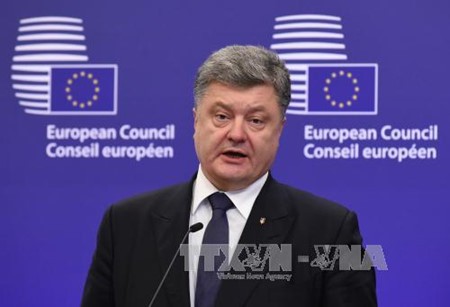(VOVworld) – The 2nd ceasefire agreement in eastern Ukraine, which was signed 2 years ago in Minsk, Belarus, has failed to end the violence.
 |
| Ukrainian President Petro Poroshenko (Photo: AFP / VNA) |
The 2nd Minsk agreement was signed in February, 2015, after the 1st agreement collapsed in September, 2014. The leaders of Russia, Ukraine, France, and Germany agreed to abide by the terms of the first agreement in implementing the second one. After the agreement was signed, representatives from Ukraine, Russia, and the Organization for Security and Cooperation in Europe (OSCE) met with leaders of the Donetsk People’s Republic and the Lugansk People’s Republic twice a month in Minsk and held telephone conferences when necessary.
The agreement has failed to end violence
The 2nd Minsk agreement maps out a complex road to peace. It calls for a comprehensive and immediate ceasefire and withdrawal of heavy weapons from battlefields. It allows Ukraine to control its border with Russia under the condition that Ukraine transfer special authority to the temporary administrations of seceded regions near Russia before the end of 2015. These terms have not been fully met and violence has continued over the past 2 years. Deep mistrust has obstructed effort to reach a political solution.
Approximately 10,000 people have died in clashes. In late last year and early this year, leaders of the seceded regions were allegedly assassinated by Ukrainian agents. Tensions in Svetlodarsk and Avdeevka last month prompted Ukraine to call for an emergency meeting of the UN Security Council. Svetlana Petrenko, a spokeswoman for Russia's Investigative Committee, on Sunday accused Ukraine’s army of violating the Minsk ceasefire and the Geneva Convention protecting civilians in wartime.
During the continuous violence, eastern Ukraine, which used to be a large coal and steel production hub, has been under the management of the self-proclaimed Lugansk People’s Republic and Donetsk People’s Republic. Separatists have created their own election laws, instead of complying with Ukrainian law and the supervision of the OSCE under the Minsk agreement.
Promoting diplomatic solutions
Some people want to change the agreement because violations of the ceasefire have continued. International affairs expert Andrei Buzarov said the key task of the Minsk agreement is to resolve, not freeze the conflict. So he suggested that negotiation procedures should be changed to allow Russia and Ukraine to negotiate without mediators.
In a telephone conversation on February 7, Russian President Vladimir Putin and German Chancellor Angela Merkel called for a resumption of the ceasefire in eastern Ukraine and supported diplomatic measures to peacefully resolve conflict. They suggested meetings of the foreign ministers and of assistants to heads of states of Russia, Germany, France, and Ukraine before holding talks at a higher level.